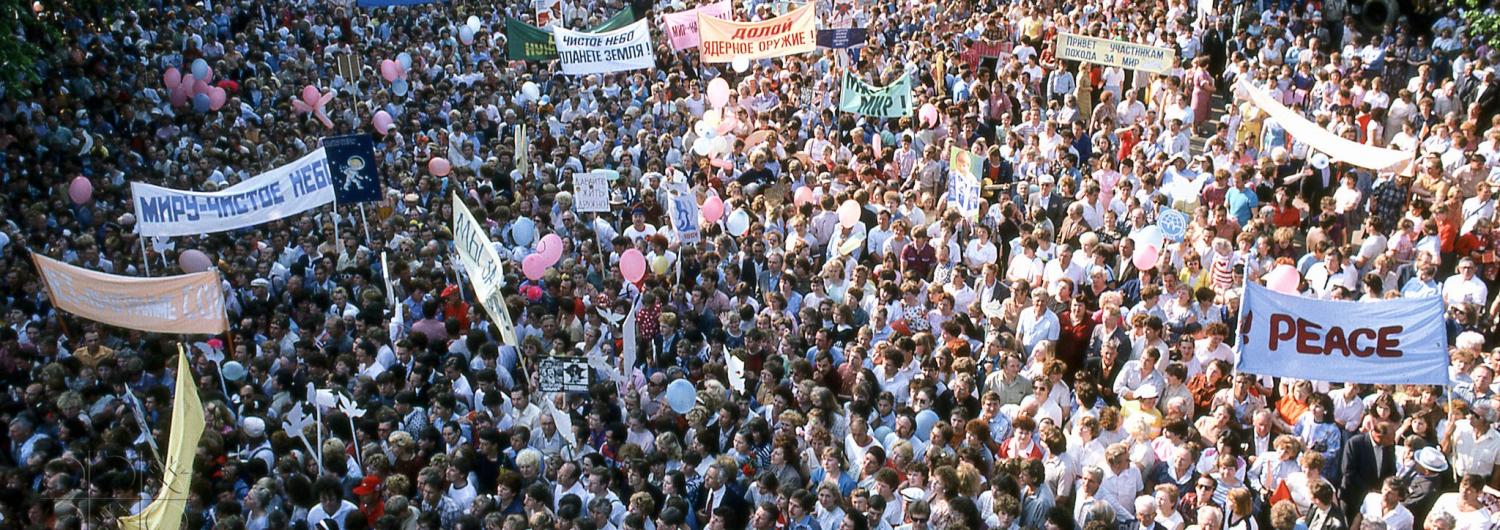On 27 March, most of the world’s nations will begin work on a UN treaty to prohibit nuclear weapons. This will be the first time in more than two decades that multilateral nuclear disarmament negotiations have taken place. Australia, regrettably, will not be represented. It announced last month that it plans to boycott the historic talks, as the treaty is not in our 'national interests'.
Successive federal governments have argued that US nuclear weapons are indispensable for Australia’s security – shielding us, like an umbrella, from nuclear attack. Based on this misguided belief, Australian officials have voiced strong opposition to the proposed UN treaty, which would require Australia, upon joining, to reject any role for nuclear weapons in its military doctrines.
But is Australia’s boycott of this process – that 123 other UN member states have endorsed – compatible with its obligations under international law? As a state party to the 1968 Non-Proliferation Treaty (NPT), Australia is legally required to pursue negotiations 'in good faith' on effective measures relating to nuclear disarmament. Fulfilment of that obligation cannot be delayed indefinitely.
In a Senate committee on 2 March, Labor parliamentarian Lisa Singh asked the Department of Foreign Affairs and Trade whether 'failing to participate in the upcoming negotiations will put us in breach of our obligations under the [NPT]'. Jane Hardy, the head of the arms control and counter-proliferation branch, responded: 'We do not believe so. That is our assessment.'
But not everyone is convinced. Professor Ramesh Thakur, a disarmament expert at the Australian National University, told ABC radio on 16 March that Australia is required to be there. 'Every NPT state party, including Australia, has a legal obligation to work for complete nuclear disarmament. Therefore, not to take part is arguably a violation,' he said.
John Carlson, who served as director general of the Australian Safeguards and Non-Proliferation Office for two decades, made the same argument on The Interpreter last month. 'Boycotting the forthcoming negotiations, which are supported by the great majority of NPT parties, is inconsistent with this obligation,' he wrote, noting that the new UN treaty would constitute an 'effective measure' for disarmament.
But Hardy told the Senate committee that Australia’s participation 'would send the wrong signal'. 'We would not be able to negotiate in good faith, so we do not believe – and the government has decided – that this would be the wrong thing to do,' she said. However, the requirement of 'good faith' applies not simply to the conduct of negotiations, but also to the pursuit of negotiations.
Is Australia 'pursuing' negotiations in good faith, within the meaning of article VI of the NPT? The boycott certainly casts serious doubt on Australia’s commitment to implementing that provision. Refusing to participate in a process that is widely supported by the NPT membership and likely to produce the kind of disarmament outcomes envisaged by the treaty is clearly at odds with its object and purpose.
The government claims, disingenuously, that the proposed treaty does not constitute an 'effective measure', as nations armed with nuclear weapons will refuse to join it. In explaining why it voted against the UN General Assembly resolution last year that established the mandate for negotiations, Australia said that the treaty will 'be ineffective in eliminating nuclear weapons'.
But the treaty need not eliminate nuclear weapons in order to be an 'effective measure'. Under article VI, it must merely relate to – or be in the direction of – nuclear disarmament. Whether or not nuclear-armed states agree to join, it clearly satisfies that requirement. (Even so, it makes no sense for Australia to prejudge the effectiveness of the outcome of the negotiations before they even start.)
Experience with other types of weapons has shown that negotiating a prohibition facilitates progress towards disarmament. It is difficult to imagine, for example, that the great gains made towards eliminating chemical weapons and anti-personnel landmines would have been possible without a decision by states to impose global prohibitions on those weapons, which stigmatised their use and stockpiling.
Weapons that are outlawed are increasingly seen as illegitimate, losing their political status and, along with it, the resources for their production, modernisation and retention. Arms companies find it more difficult to obtain contracts and financing for work on illegal weapons, and such work carries a great reputational risk. It defies logic that the new treaty on nuclear weapons will have no impact on disarmament.
But Australia’s argument about the supposed ineffectiveness of this widely supported treaty is simply a cover for its true – and rarely stated – reason for opposing the ban: it wants to continue, indefinitely, claiming 'protection' from US nuclear forces. Under the terms of the NPT, that certainly is not an acceptable legal justification for boycotting multilateral nuclear disarmament negotiations.
